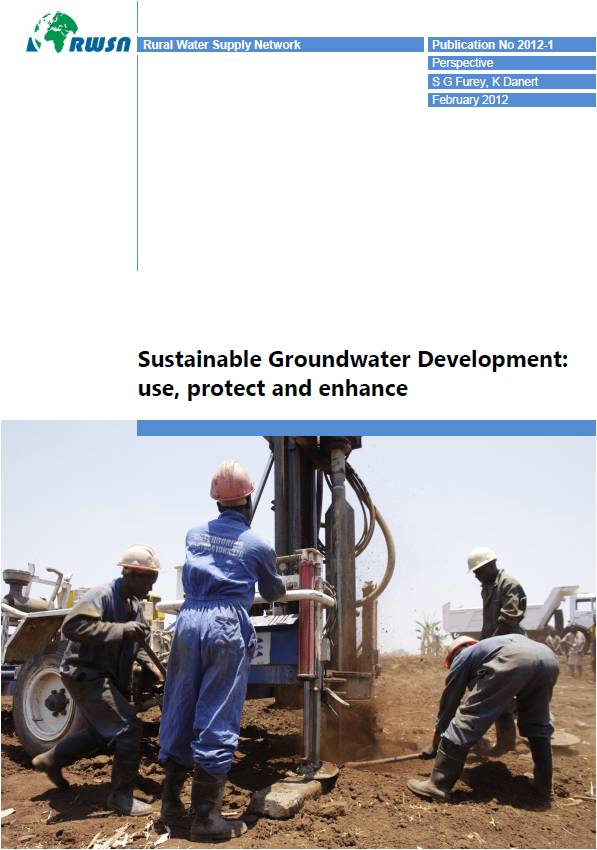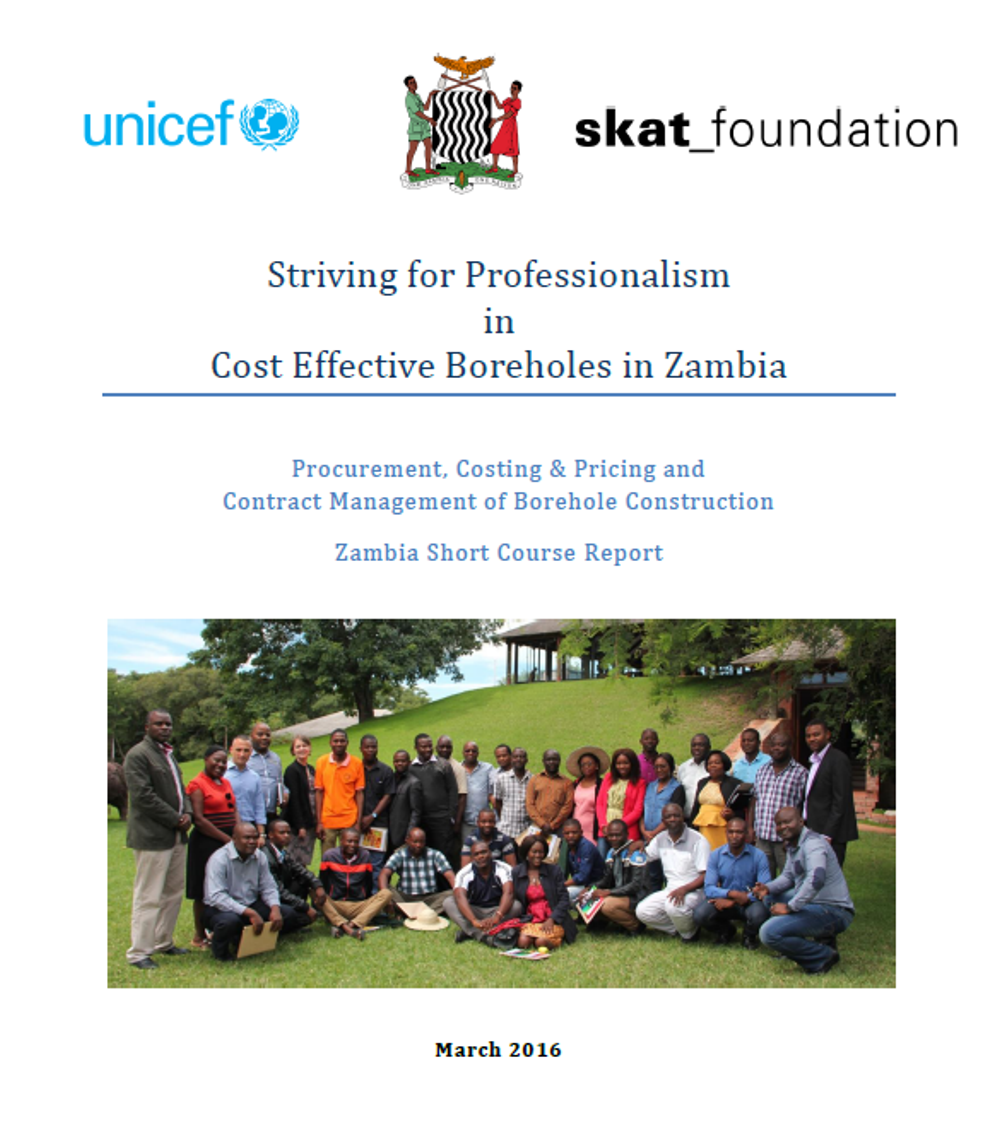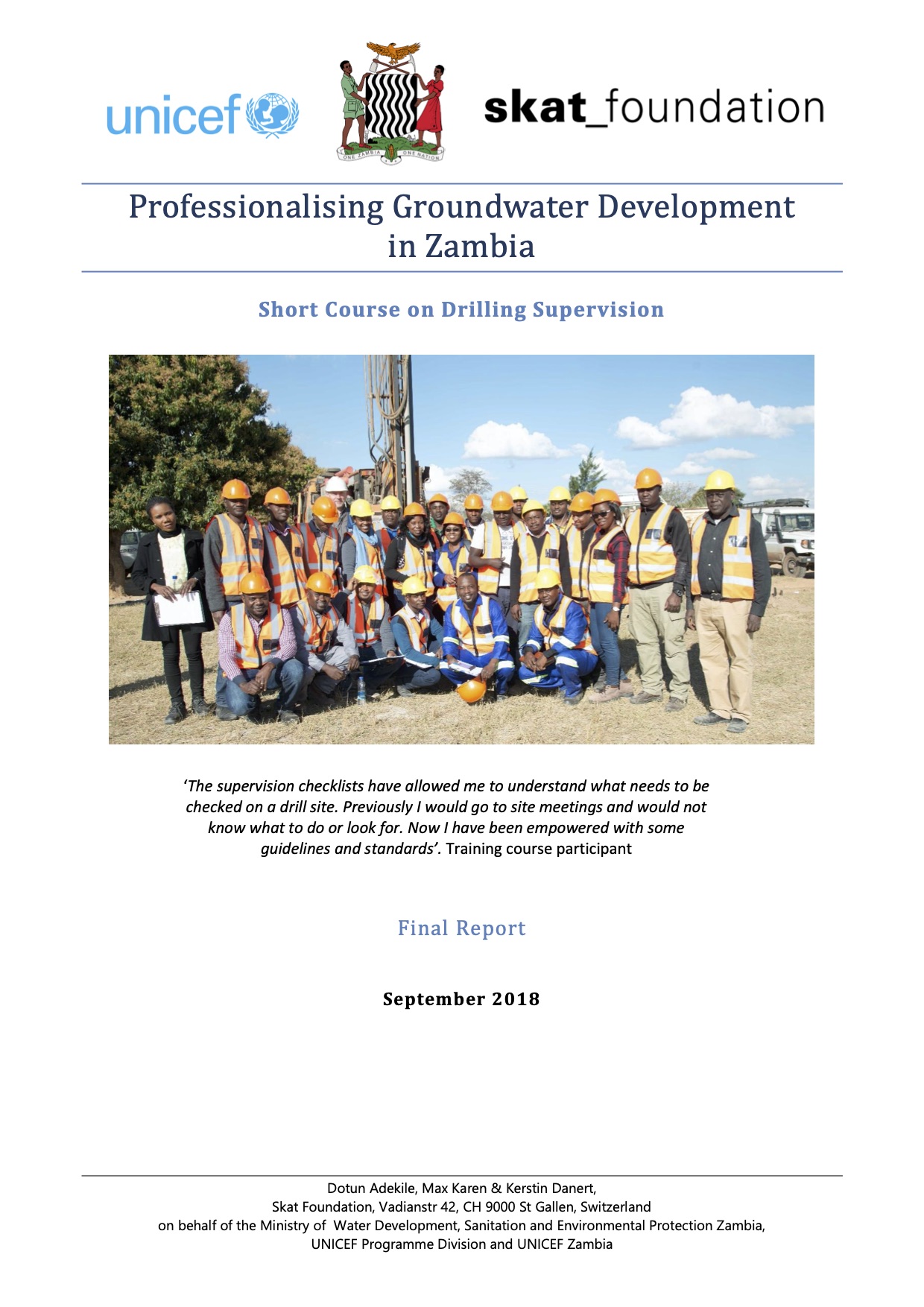The fact that many boreholes fail, or perform poorly within a short time from construction is partly due, to a lack of professionalism in the drilling sector and the agencies and individuals that engage with it. To provide a good water supply service, every water well drilled and every pump installed must be undertaken in a professional manner. Also, the data obtained from siting and drilling should be collected and used to improve understanding of the groundwater resource.
Since 2004, RWSN partners have championed the topic of water well drilling professionalism. They have undertaken studies, published guidelines and animated films, ran webinars and supported face-to-face and online training courses to raise water well drilling professionalism around the world. The wealth of information available is catalogued below.
This publication provides an overview of what this RWSN theme has achieved: Striving for Borehole Drilling Professionalism in Africa: A Review of a 16-Year Initiative through the Rural Water Supply Network from 2004 to 2020
All RWSN publications on Borehole Drilling Professionalism (in English, French, Portuguese) below are available in the RWSN website library.
Note: specific information on Manual Drilling is catalogued on a separate website.
Animated Educational Films
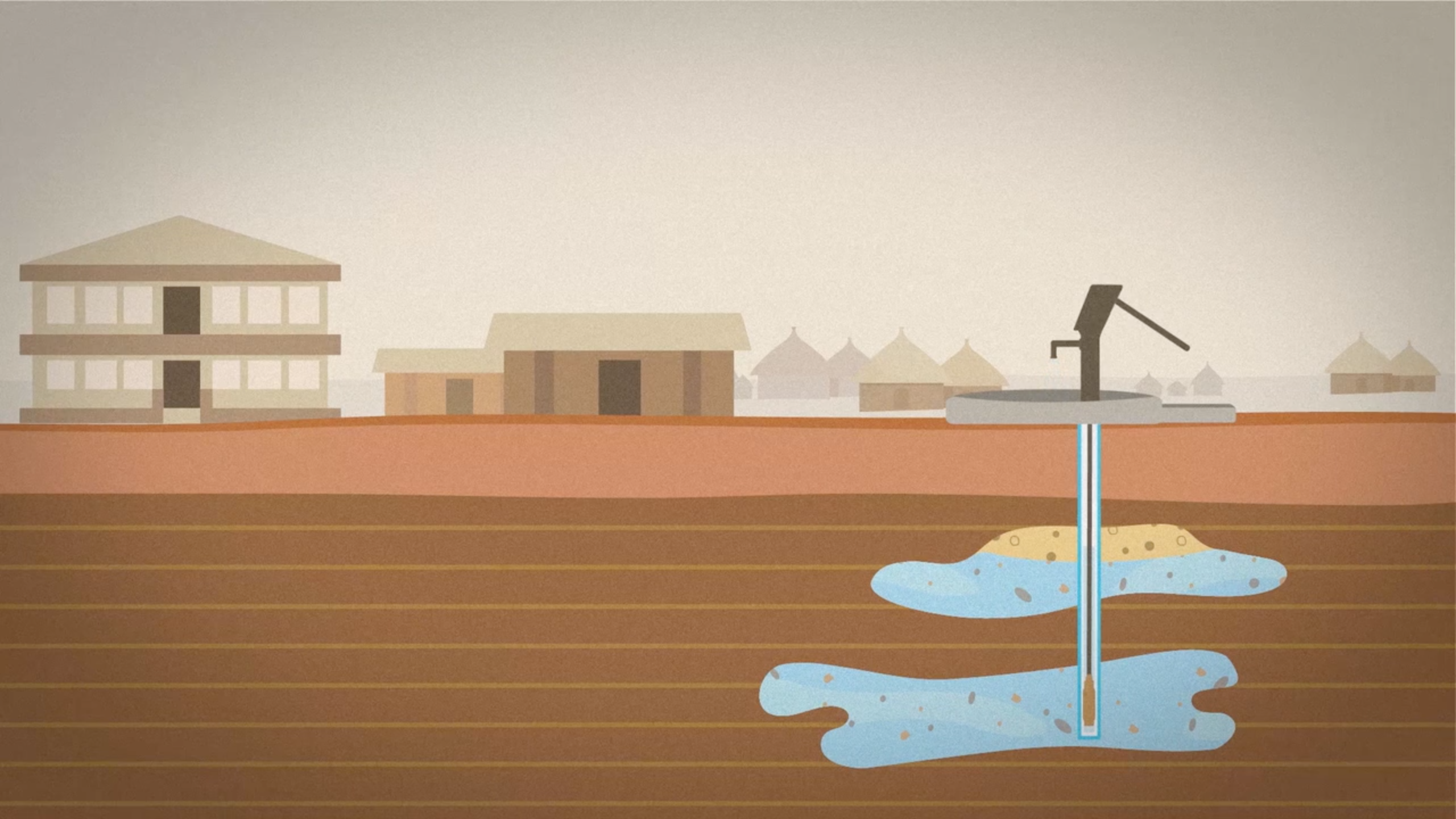 |
Drilling: the importance of good borehole siting - if properly located, a borehole can provide a good supply of water. If it is not, it will fail, resulting in wasted investment. This short film explains good borehole siting and its importance. |
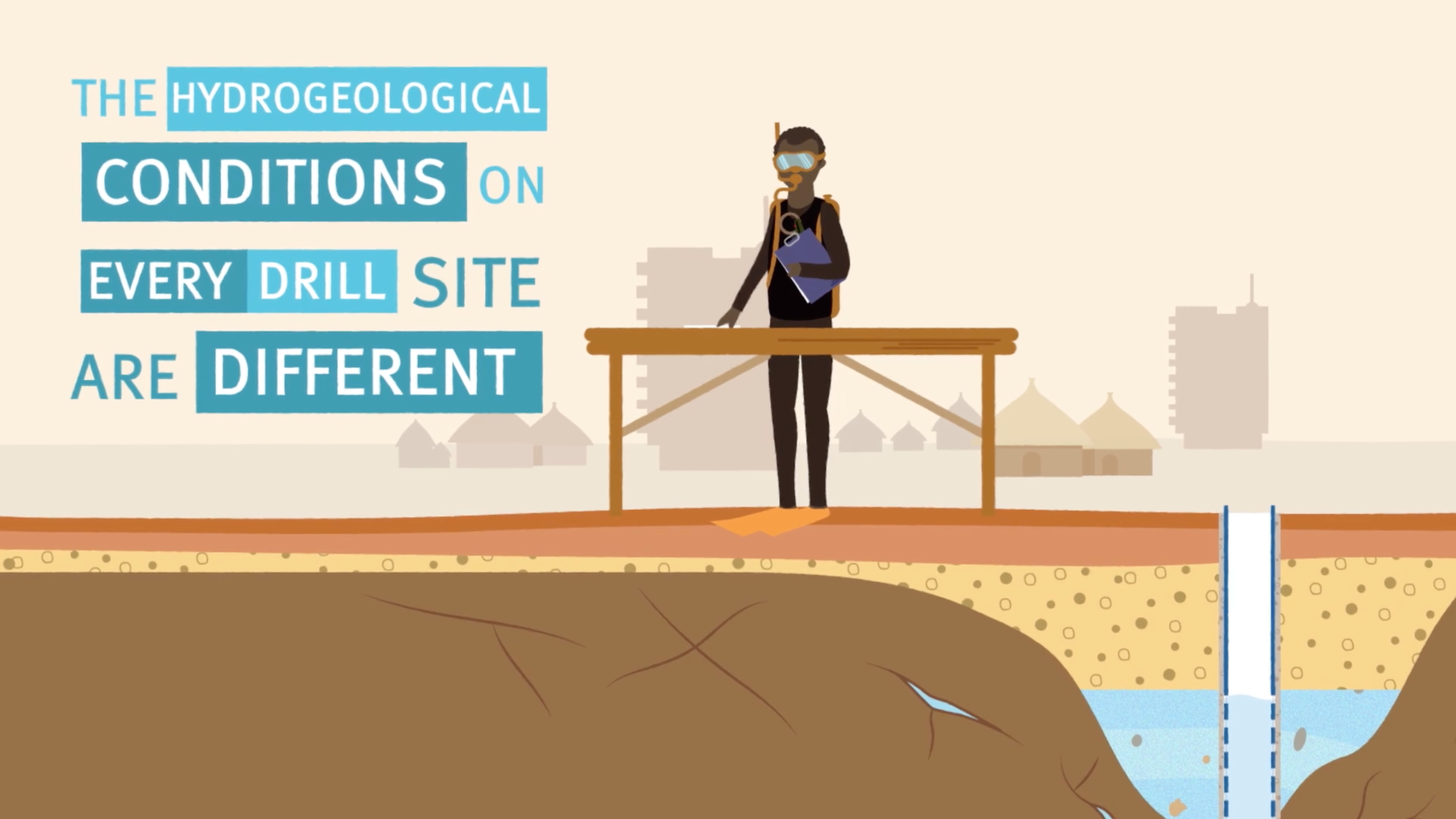 |
Why are some boreholes better than others? - learn about the basics of good of borehole siting, design, construction and well development. Find out about casing and screen, gravel pack, and the sanitary seal and see that silting is one reason for boreholes failure. |
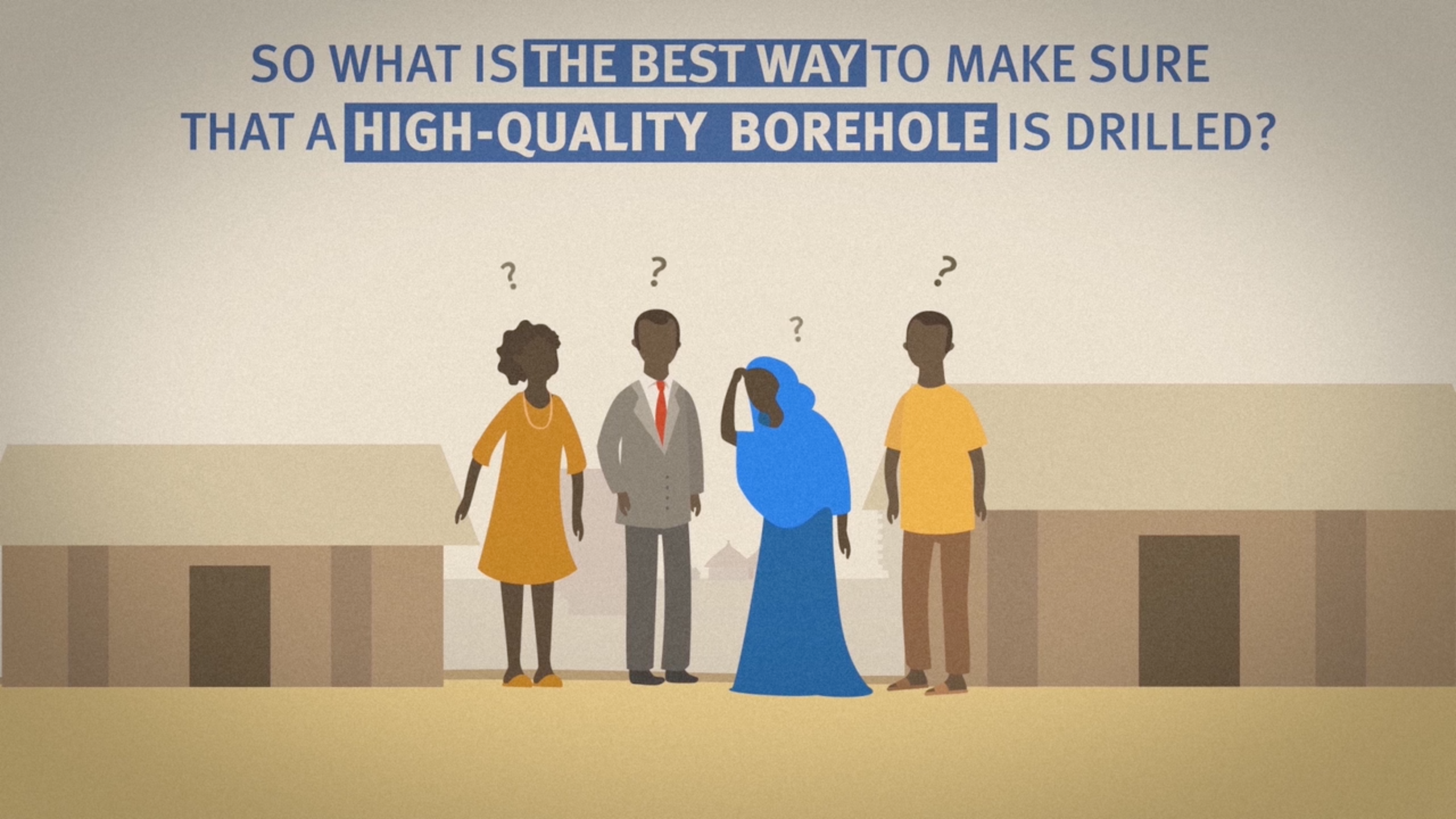 |
A borehole that lasts for a lifetime - explains the procedures, including drilling supervision, needed to provide a good drilled water supply that can last for many years. |
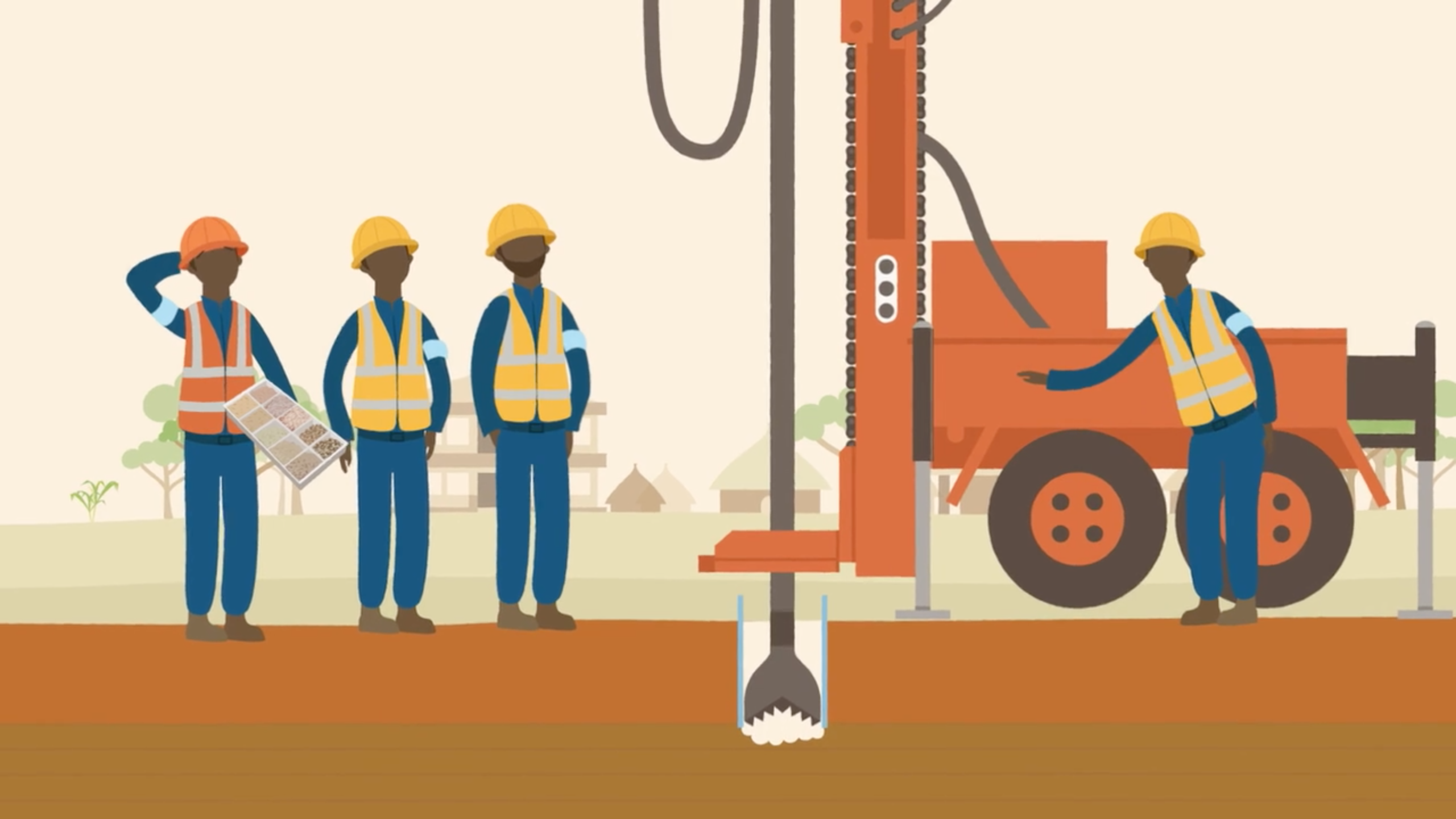 |
Four steps to better drilling contracts covers drilling procurement and contract management. It explains: (i) preparing a procurement plan, (ii) a systematic contract award process, (iii) professional contract management, including regular communication, supervision and timely payment and (iv) monitoring and reporting after construction. |
|
Together, the above four animated films on borehole drilling professionalism (English and French) explain siting, drilling supervision, contract management and the basic of water wells in up to five minutes each. |
|
Guidance on Professional Water Well Drilling
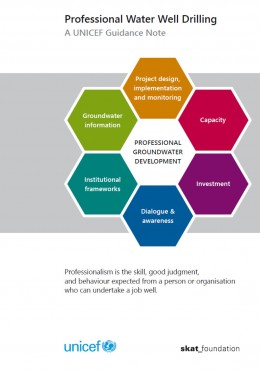 |
Professional Water Well Drilling – A Guidance Note (English & French) – is for those who manage or support water well drilling programmes and projects. Provides guidance on project design, implementation and monitoring; groundwater information; capacity; institutional frameworks; investment; and dialogue and awareness. |
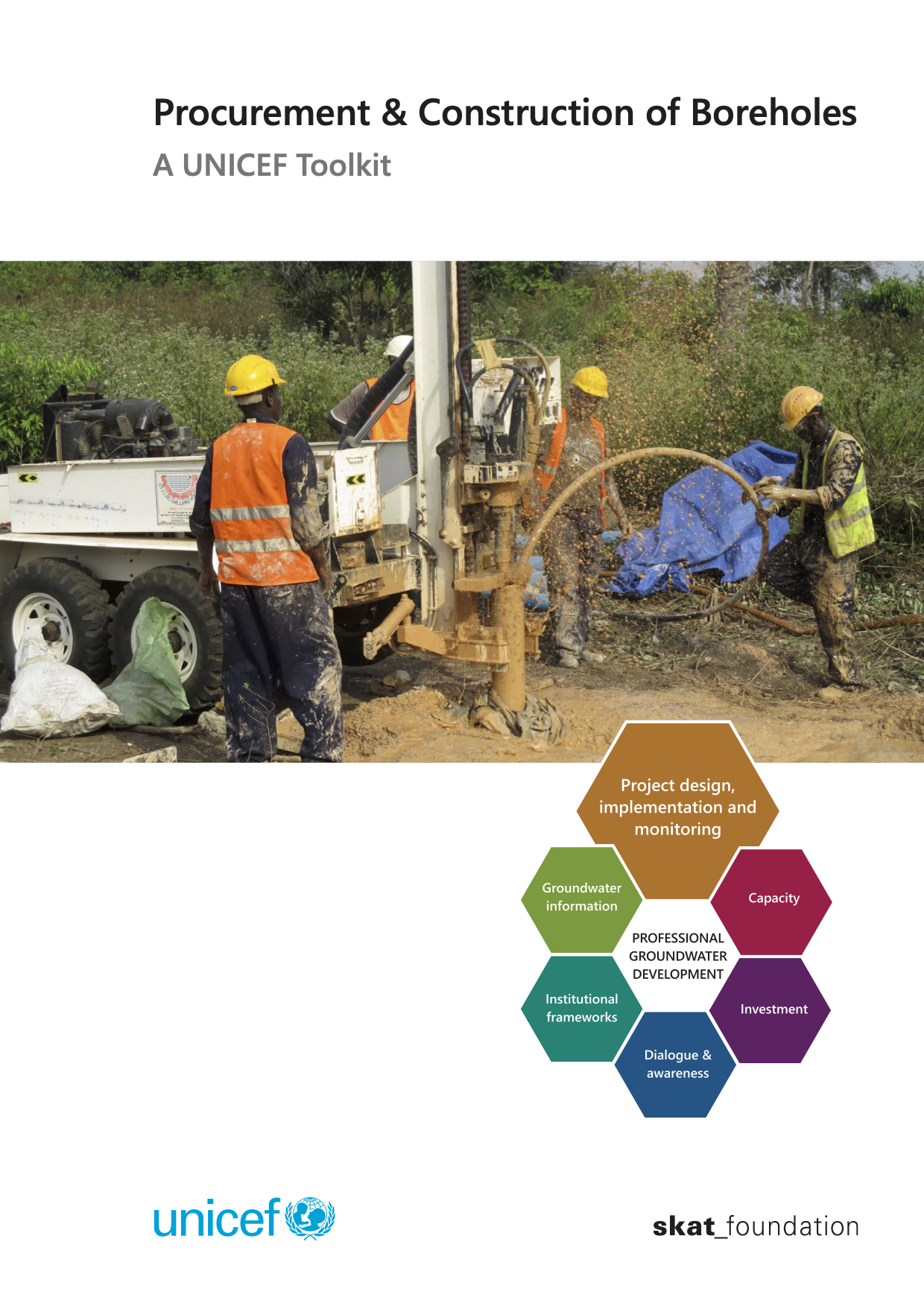 |
Borehole Drilling – Planning, Contracting & Management: A UNICEF Toolkit (English & French) guides UNICEF programme and supply staff through the life of a project. It follows a logical sequence on UNICEF procurement practices and provides recommendations on processes, evaluation criteria, contract provisions, generic bill of quantities, terms of reference and contractual approaches to seek technical services for siting of boreholes, borehole construction and supervision of construction works. |
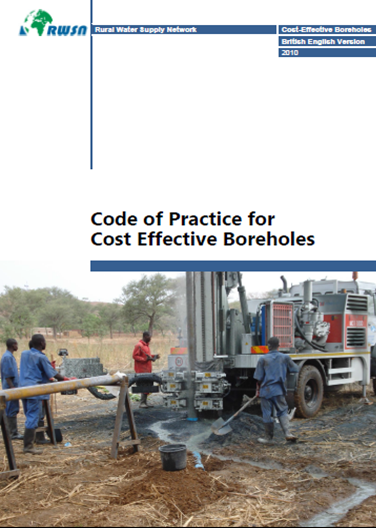 |
Code of Practice for Cost Effective Boreholes - provides a basis for the realisation of economical and sustainable access to safe water through a set of nine principles. Available in English, French and Portuguese. |
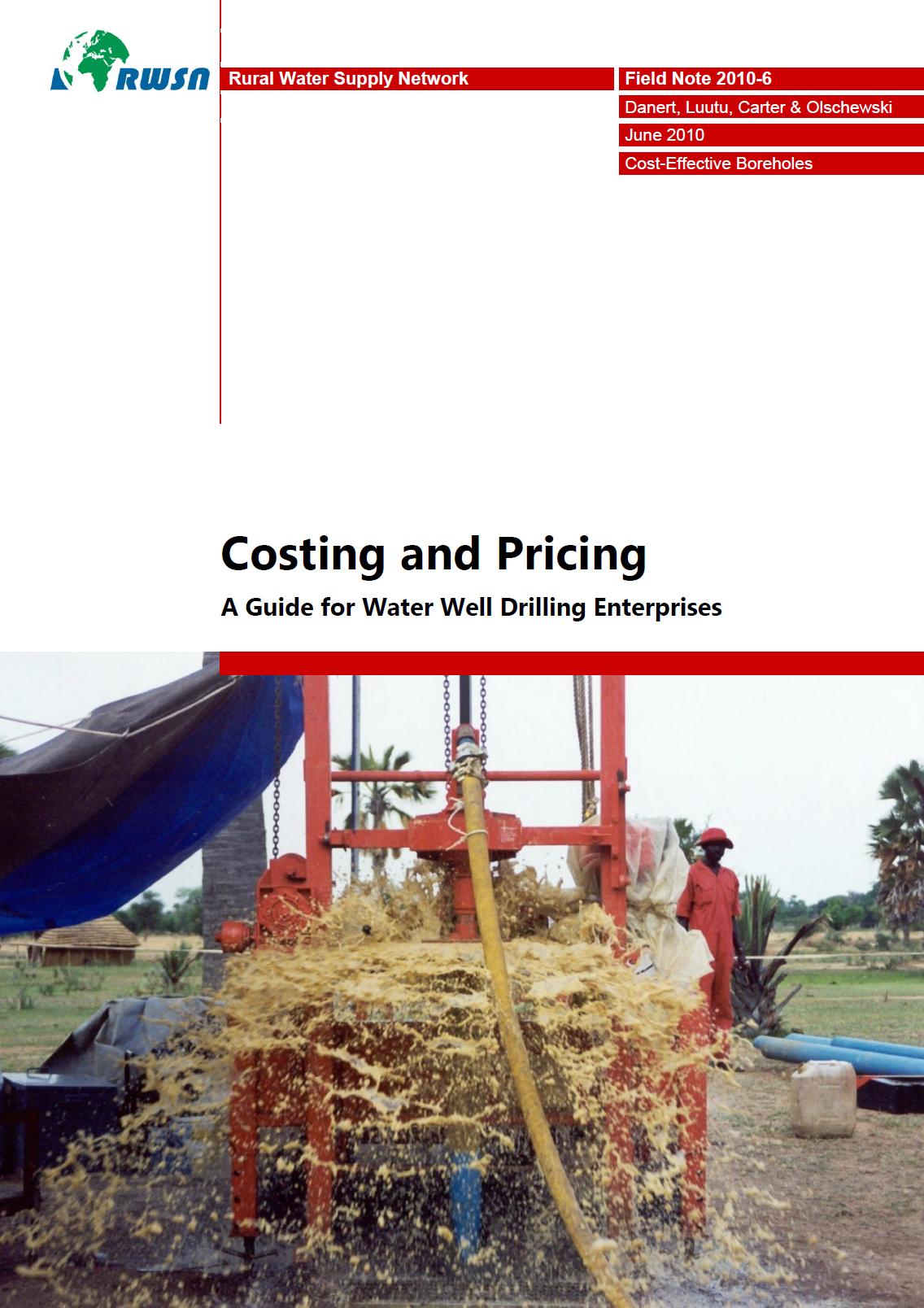 |
Costing and Pricing - A Guide for Water Well Drilling Enterprises - how to cost and price drilled water well construction and tips on business management. Available in English, French and Portuguese. |
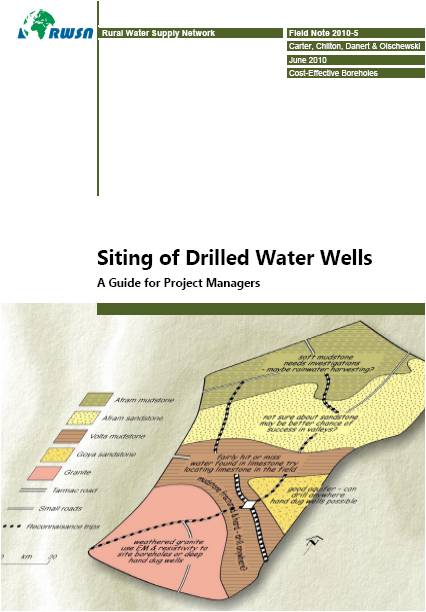 |
Siting of Drilled Water Wells - A Guide for Project Managers - a step by step guide on the siting of drilled water wells. Provides some basic explanations and explains the essential requirements for a simple groundwater model. Available in English and French. |
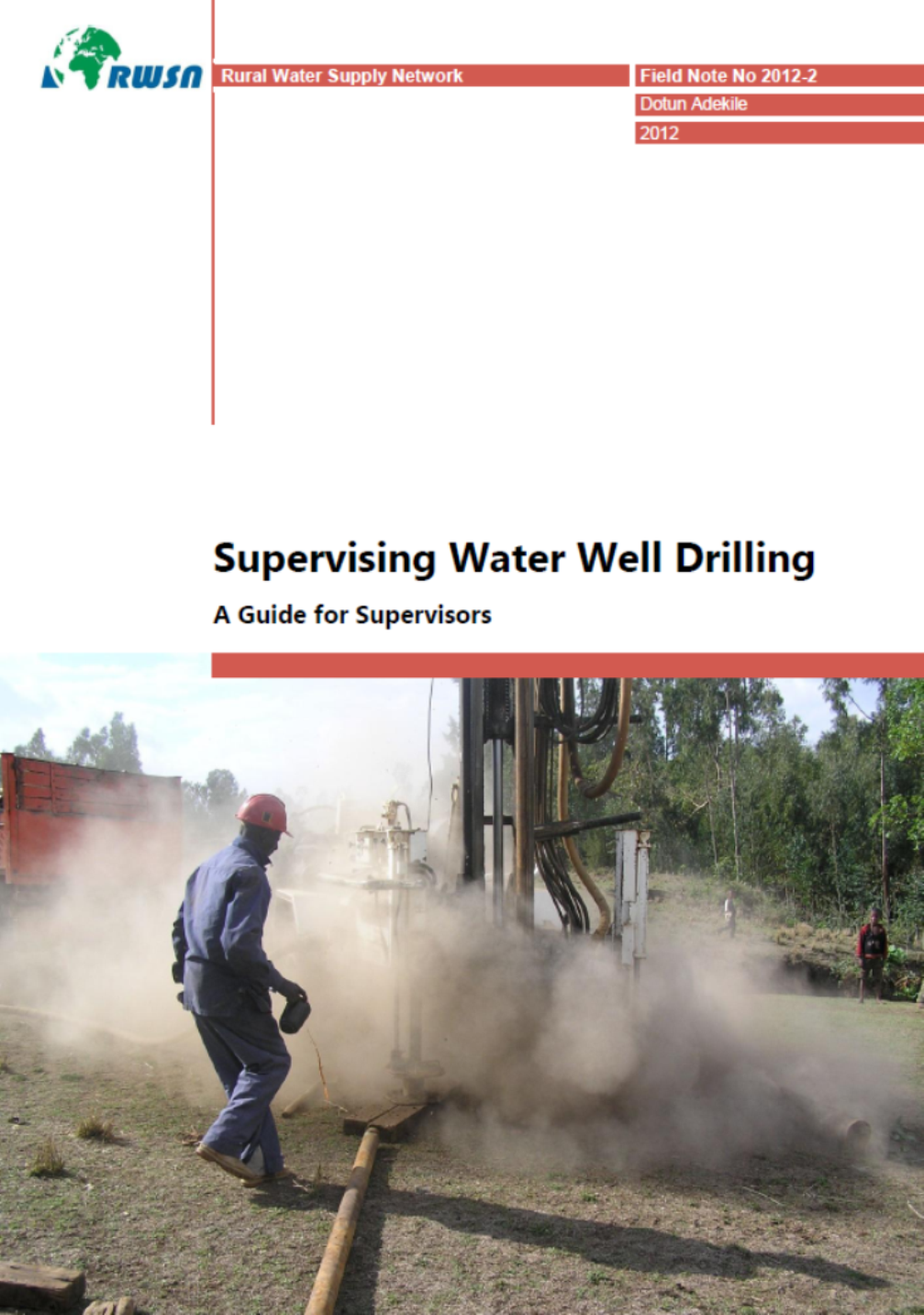 |
Supervising Water Well Drilling - A guide for supervisors - assists those in charge of the supervision of borehole construction and project managers. It details the responsibilities of the drilling supervisor at the different stages of borehole construction to ensure that the driller delivers the borehole as specified in the contract. Available in English, French and Portuguese. |
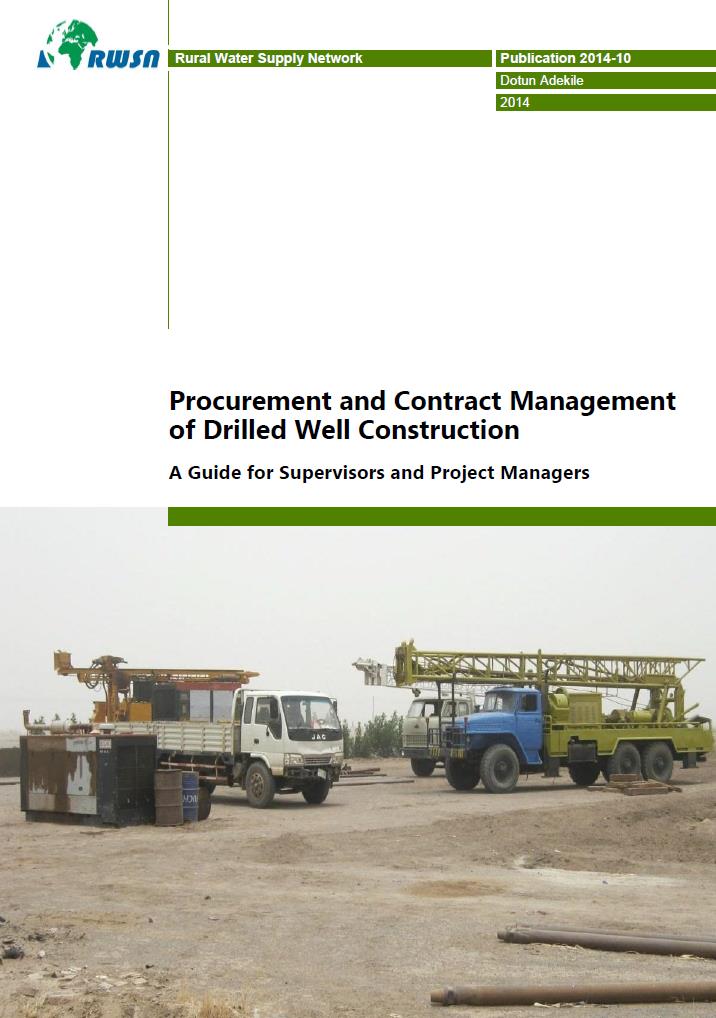 |
Procurement and Contract Management of Drilled Well Construction - A Guide for Supervisors and Project Managers - sets out procurement and contract management procedures for the engagement of professional groundwater consultants, drilling contractors and suppliers. The publication will enable clients to ensure that they have the know-how to obtain the expected results from drilling contracts. Available in English, French and Portuguese. |
|
|
Sustainable Groundwater Development: use, protect and enhance - provides an understanding of the crucial importance of groundwater and the risk for sustainability. It encourages users of groundwater to protect and enhance this precious resource for long term benefit. Available in English and French. |
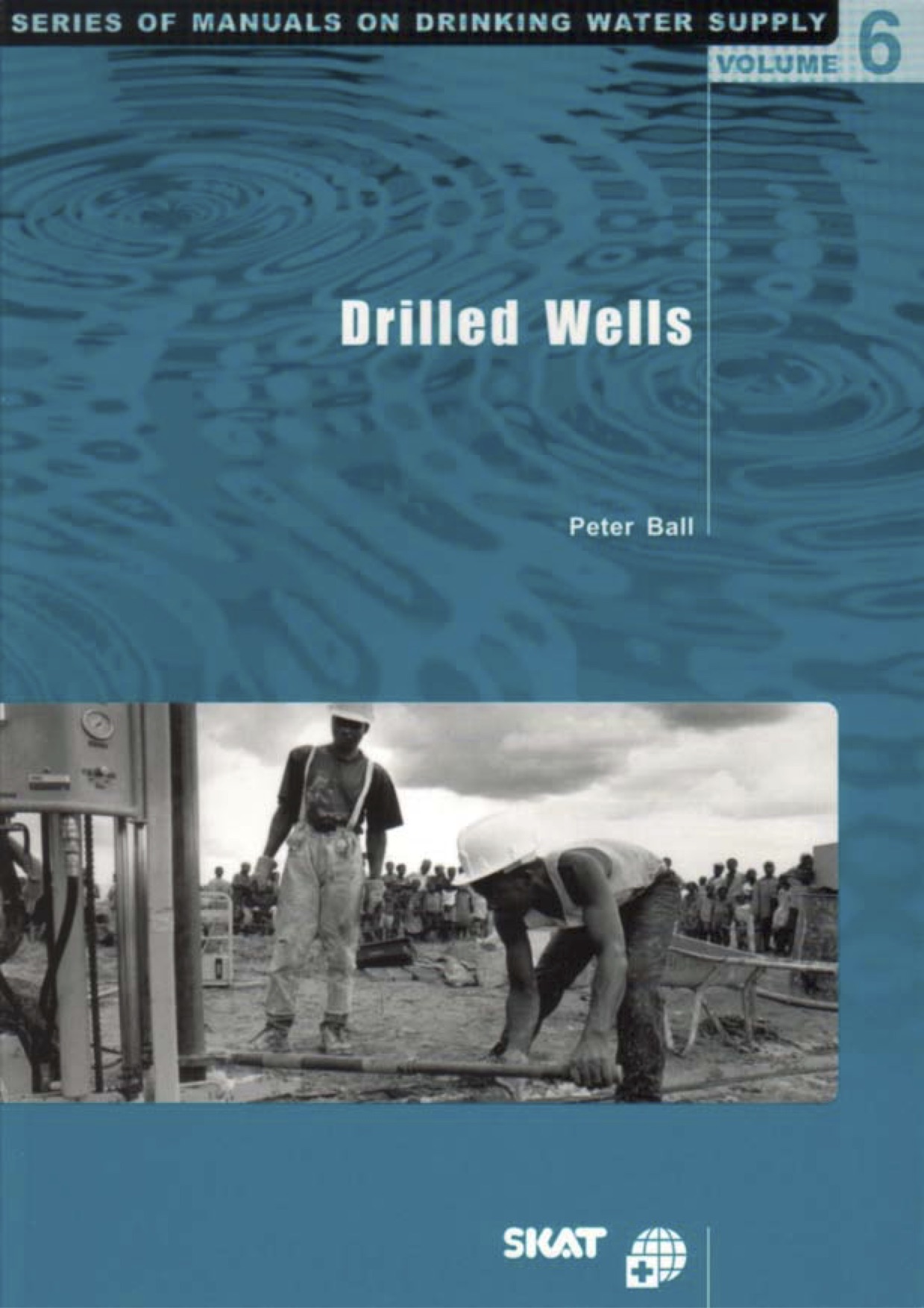 |
Drilled Wells - Explains in practical terms the basic drilling techniques, well design, types of pump, their installation, screen selection and testing. |
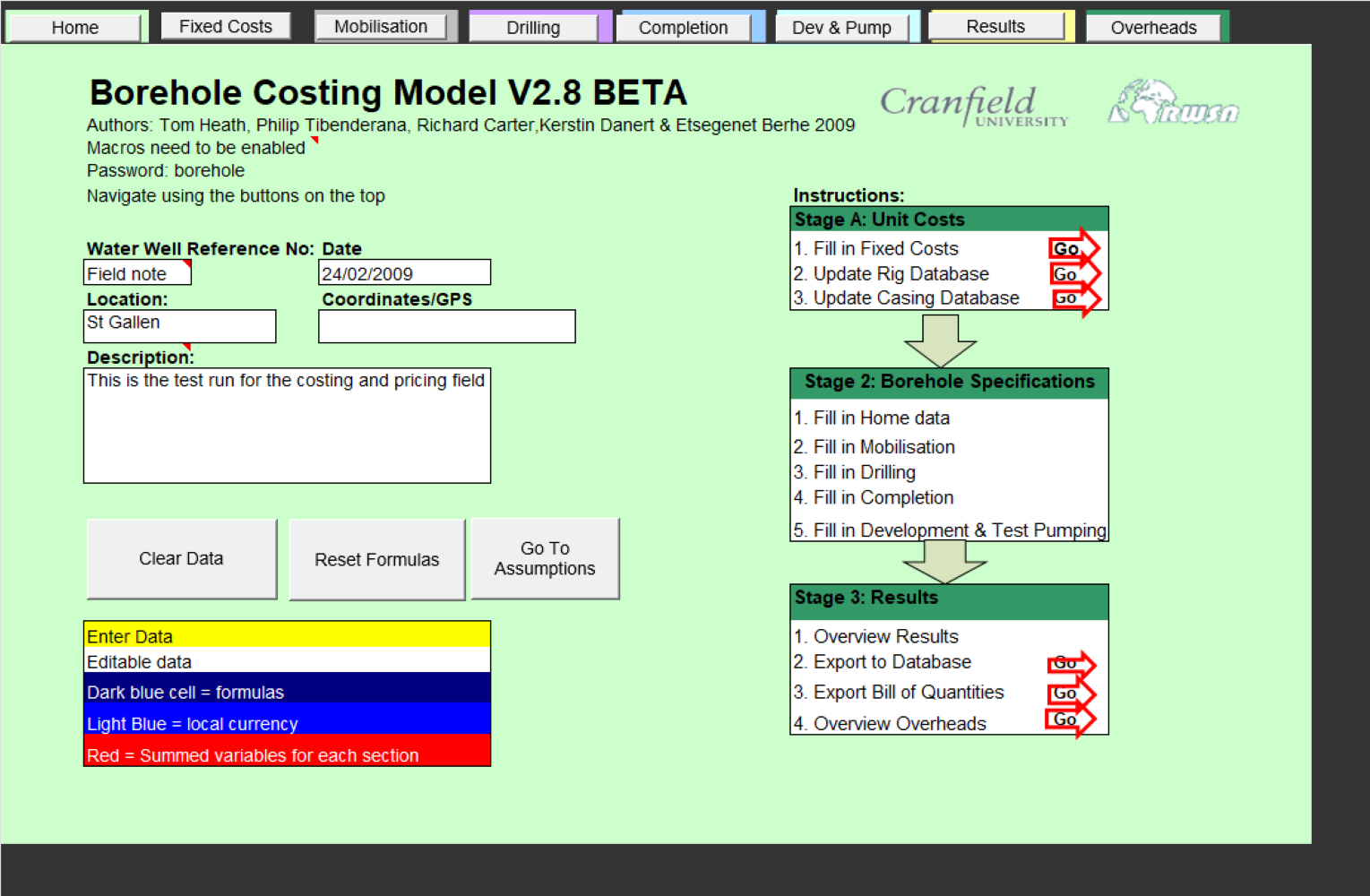 |
Borehole Costing Model V2.8 BETA & Quick Start Guide - calculate the actual cost of a borehole with this excel sheet and guide. |
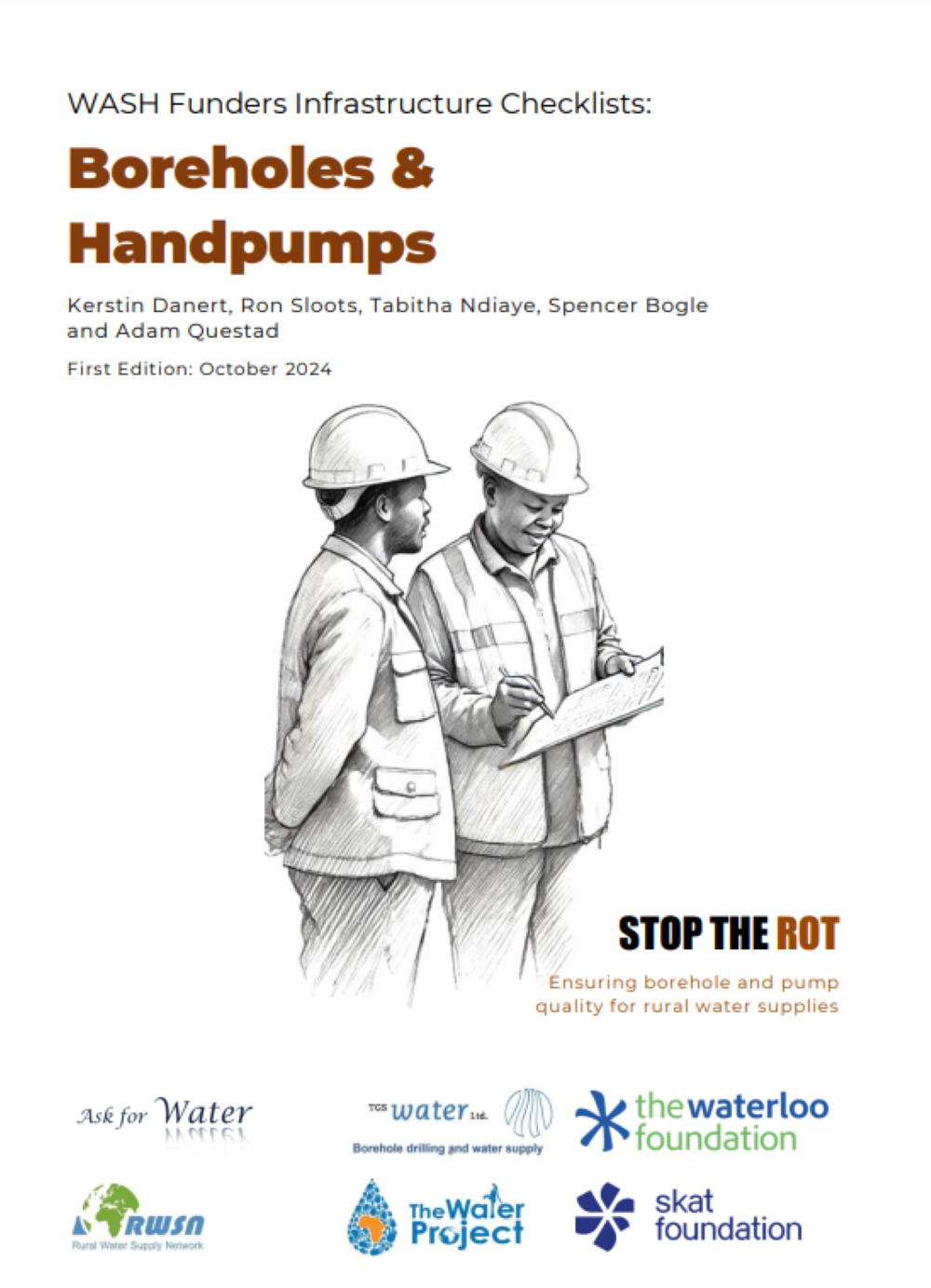 |
WASH Funders Infrastructure Checklists: Boreholes and Handpumps - provides a set of four checklists that should help organisations funding Water, Sanitation and Hygiene (WASH) projects and programmes to ask the right questions in relation to borehole and handpump design and construction quality. |
|
All RWSN Guidance Documents on Professional Drilling (in English, French and Portuguese)
|
|
Training (online & face-to-face) |
|
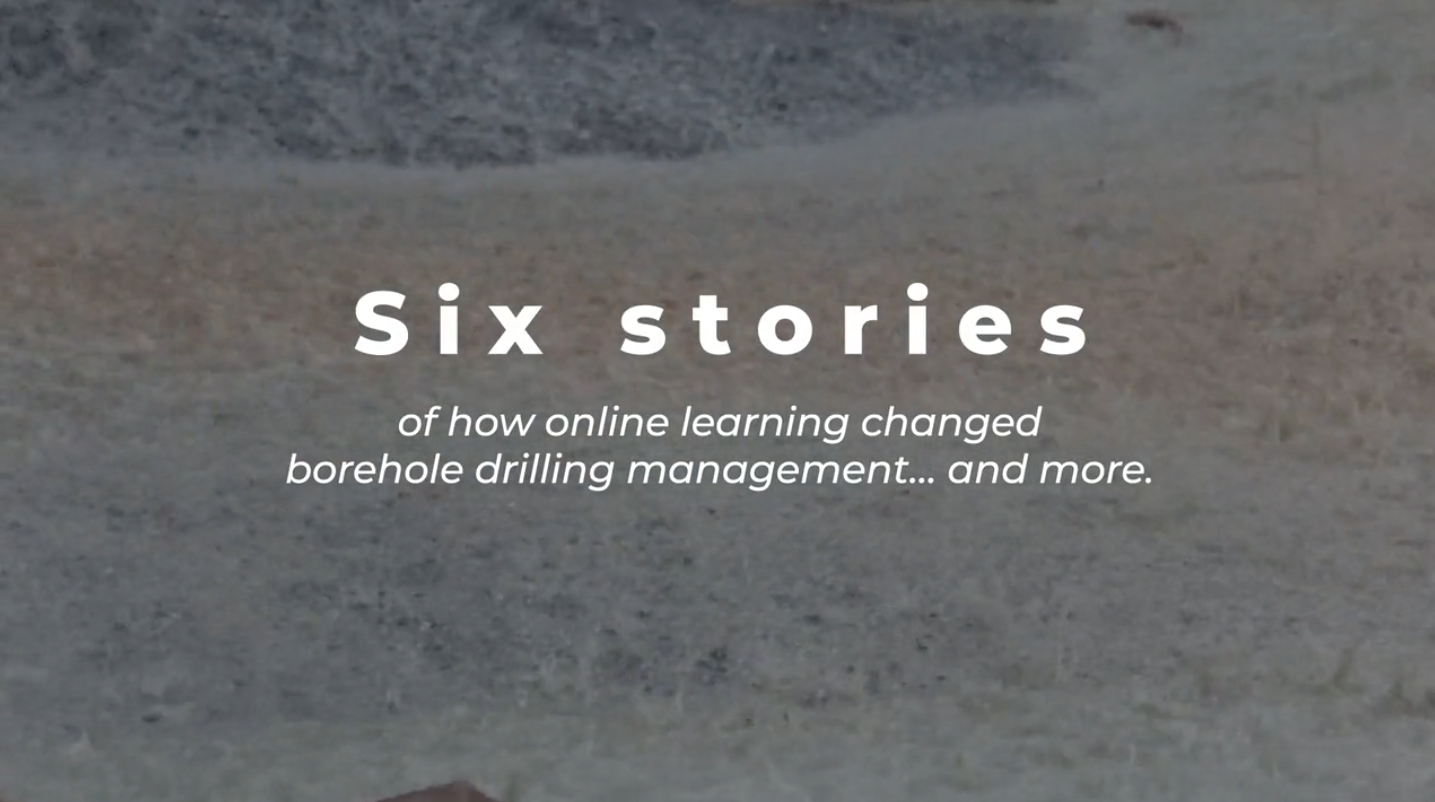 |
Groundwater today into the future: Impact stories from participants of online courses on professional drilling management |
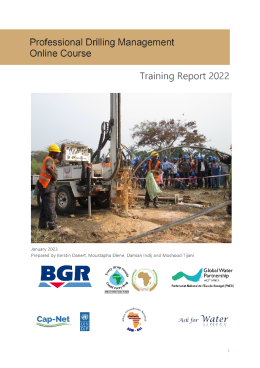 |
Online course on professional drilling management (2022) |
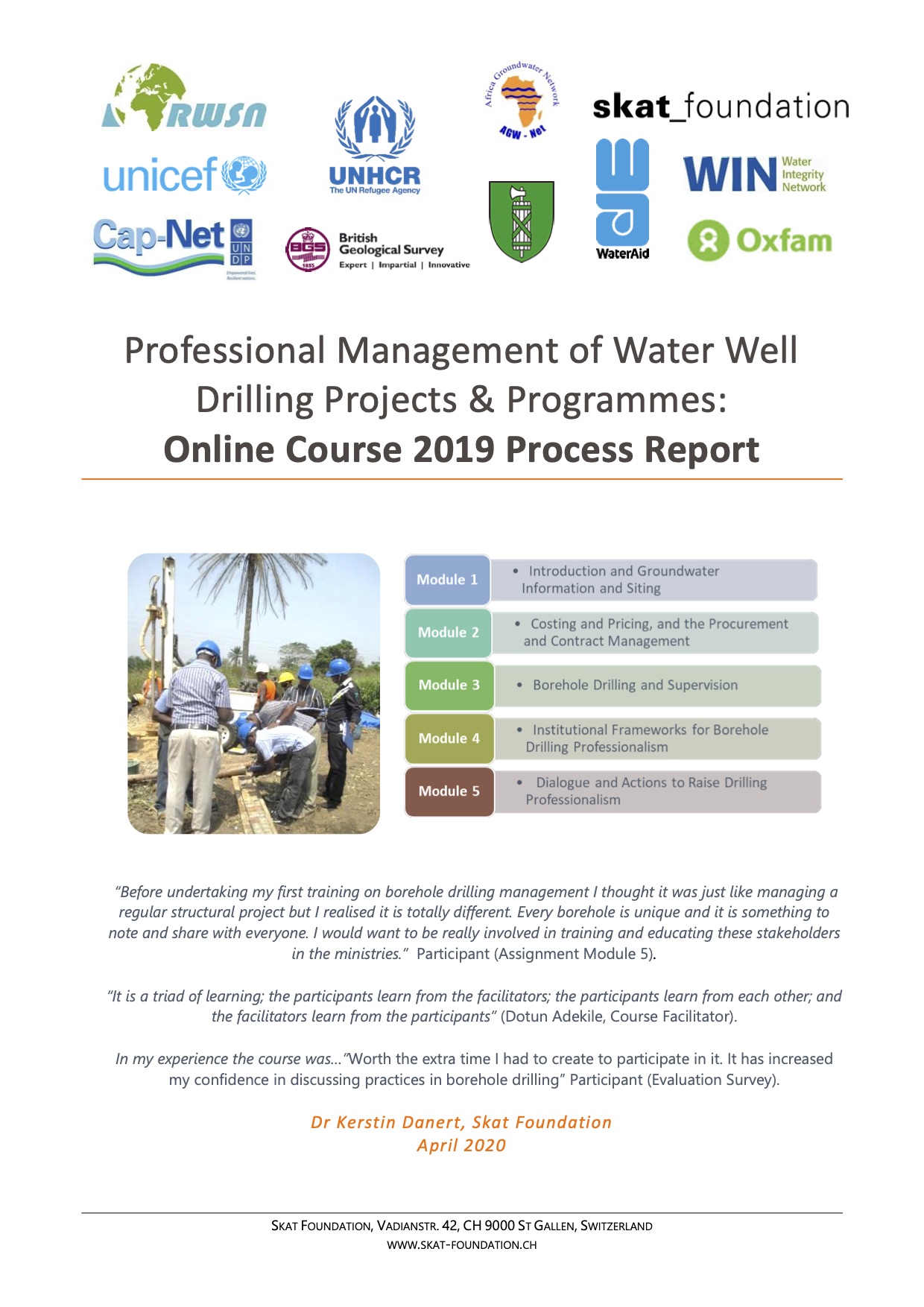 |
Online course on professional drilling management (2019) Process report (English) |
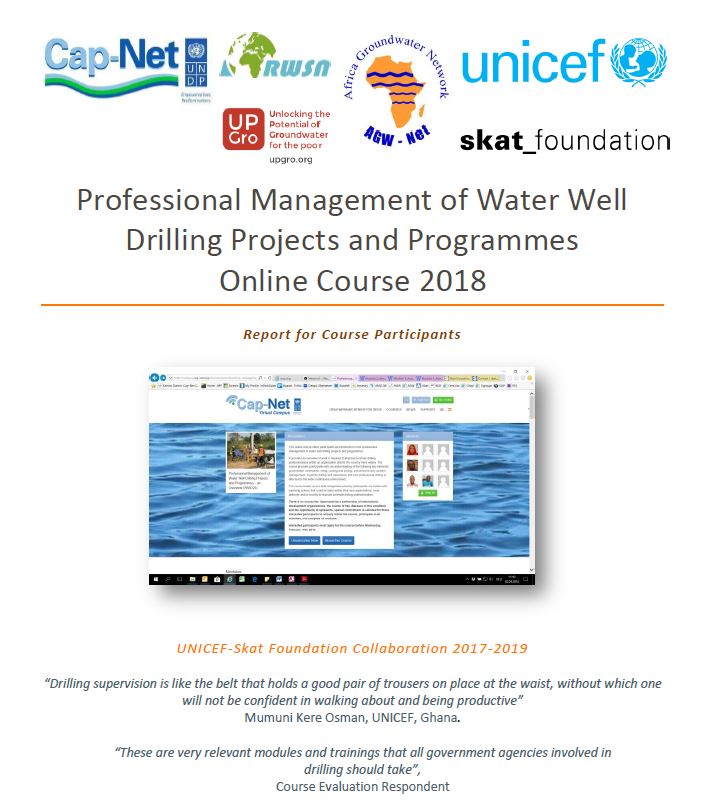 |
Online course on professional drilling management (2018) by Skat Foundation, UNICEF and UNDP Cap-Net (report, blog and course materials). |
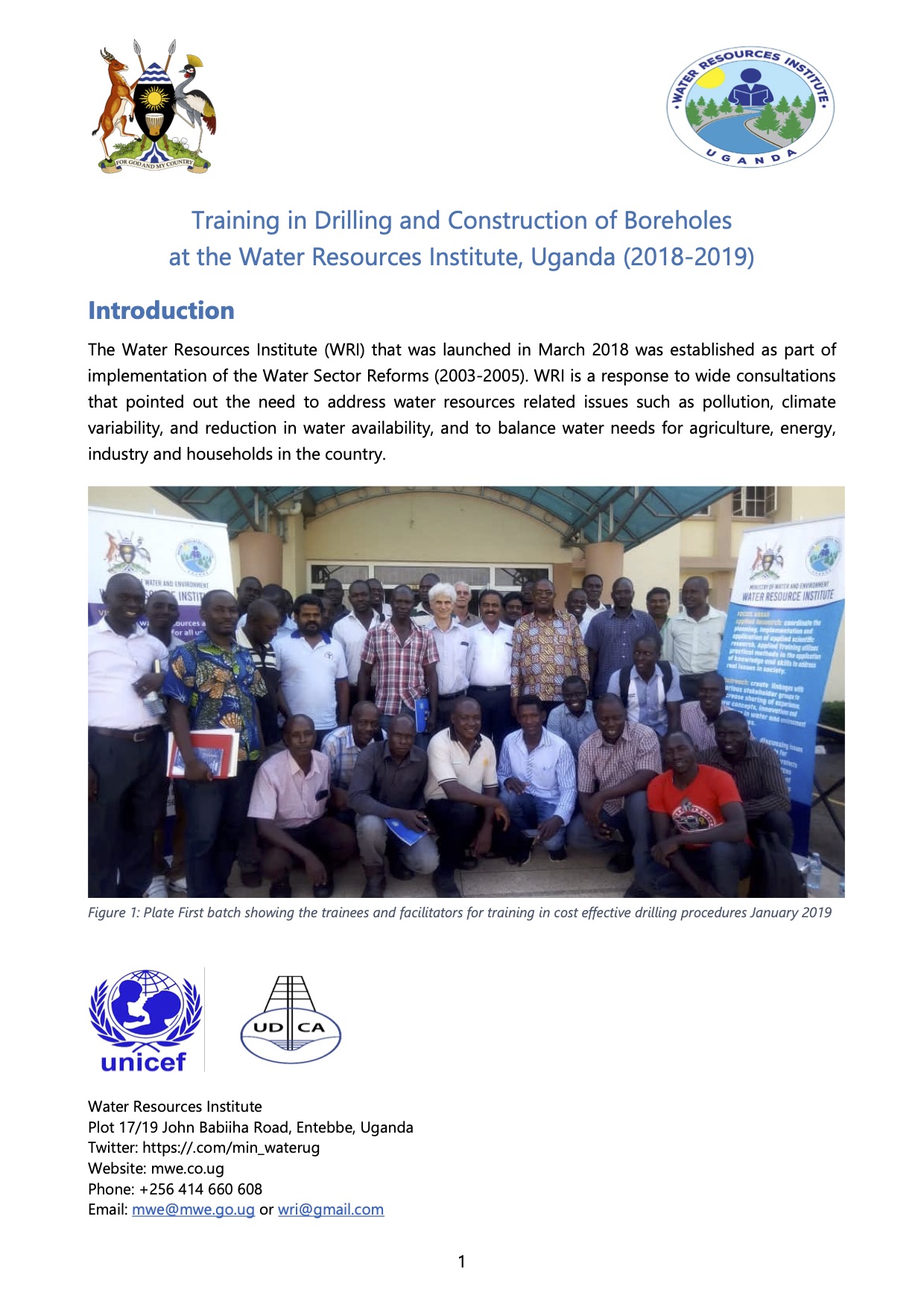 |
Uganda - Training in Drilling and Construction of Boreholes (2018-2019) at the Water Resources Institute (overview) |
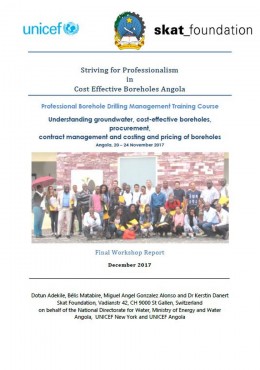 |
Angola - short course on Procurement, Contract Management and Costing and Pricing (2017) by Skat Foundation and UNICEF (report). |
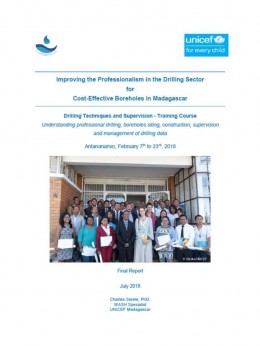 |
Madagascar - short course on drilling techniques and supervision (2018) |
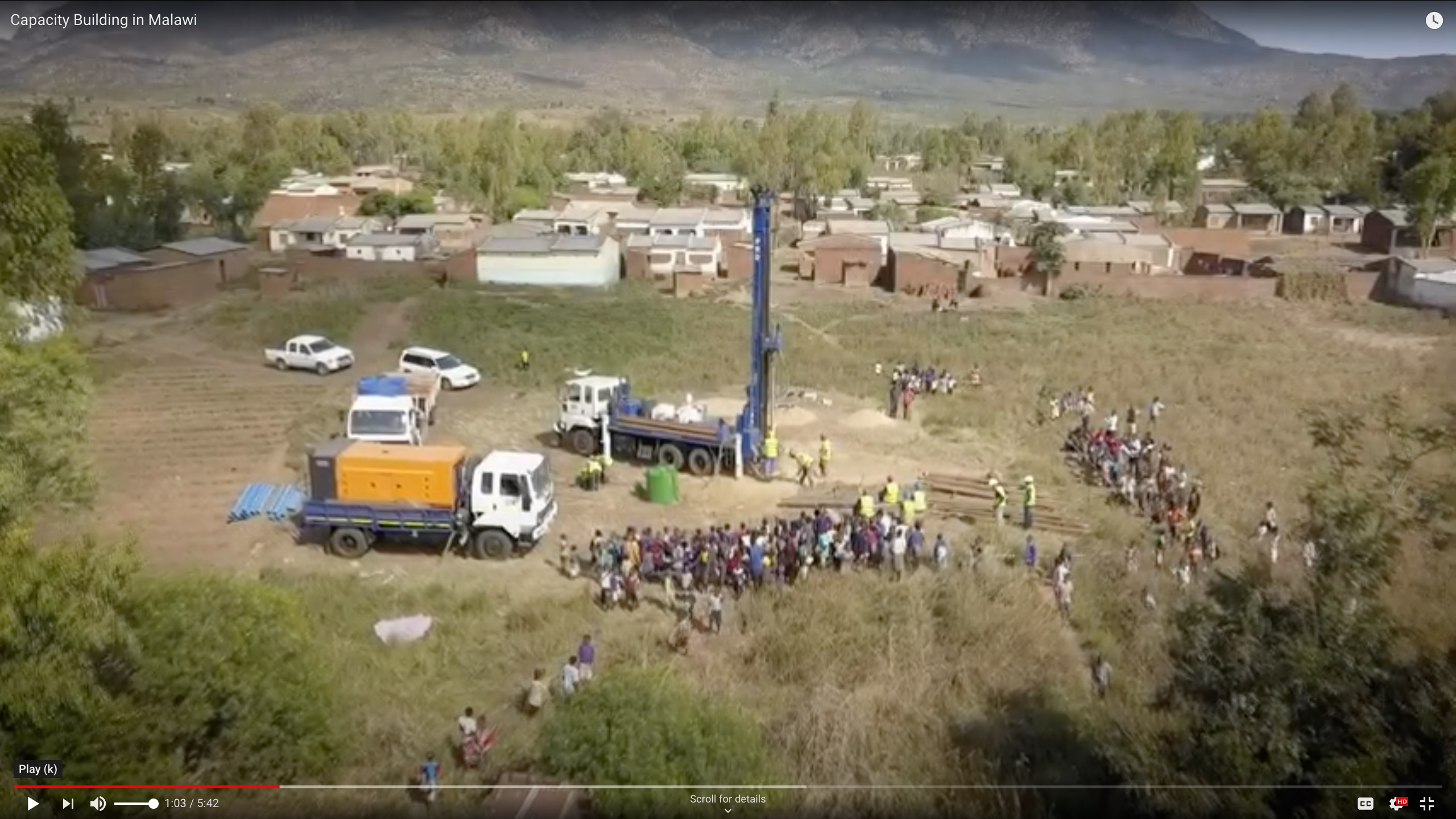 |
Malawi - short course on Water Supply Borehole Drilling Supervision (2018) |
 |
Sierra Leone - short courses on siting, procurement and contract management and costing and pricing of water well drilling (2013 & 2014) by Skat Foundation (report). |
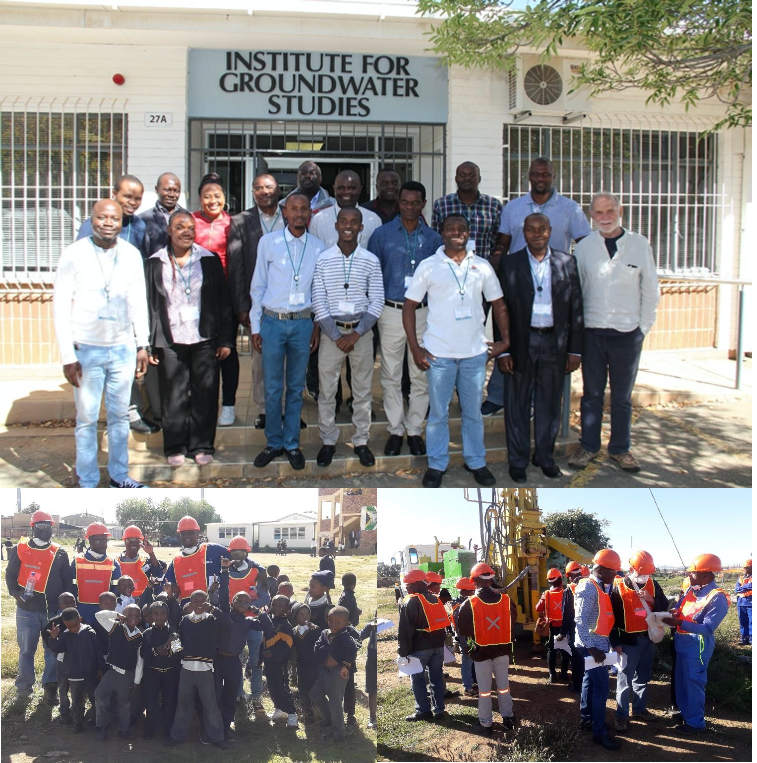 |
South Africa - SADC-GMI Short Course 1: Drilling Supervision (2018) by SADC-GMI and the African Groundwater Network (AGW-Net) (report and news article) |
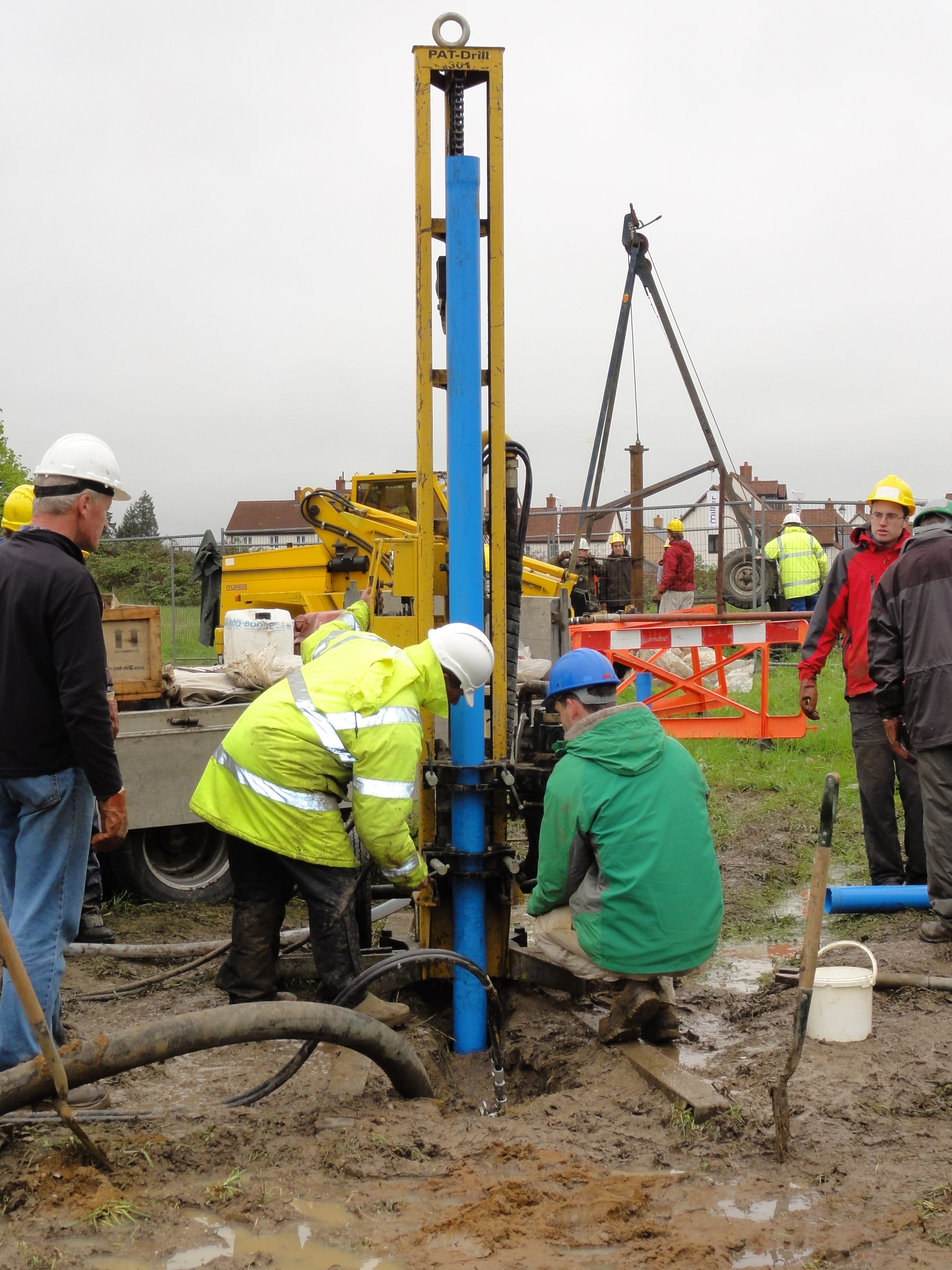 |
United Kingdom - The Drilling Course- Developing Groundwater (2019 and previous) by redr UK (course website) |
|
|
Zambia - short course on procurement, costing and pricing and contract administration (2016) by Skat Foundation and UNICEF (report)
Zambia - short course on drilling supervision (2018) by Skat Foundation and UNICEF (report and film) |
Experiences from around the world
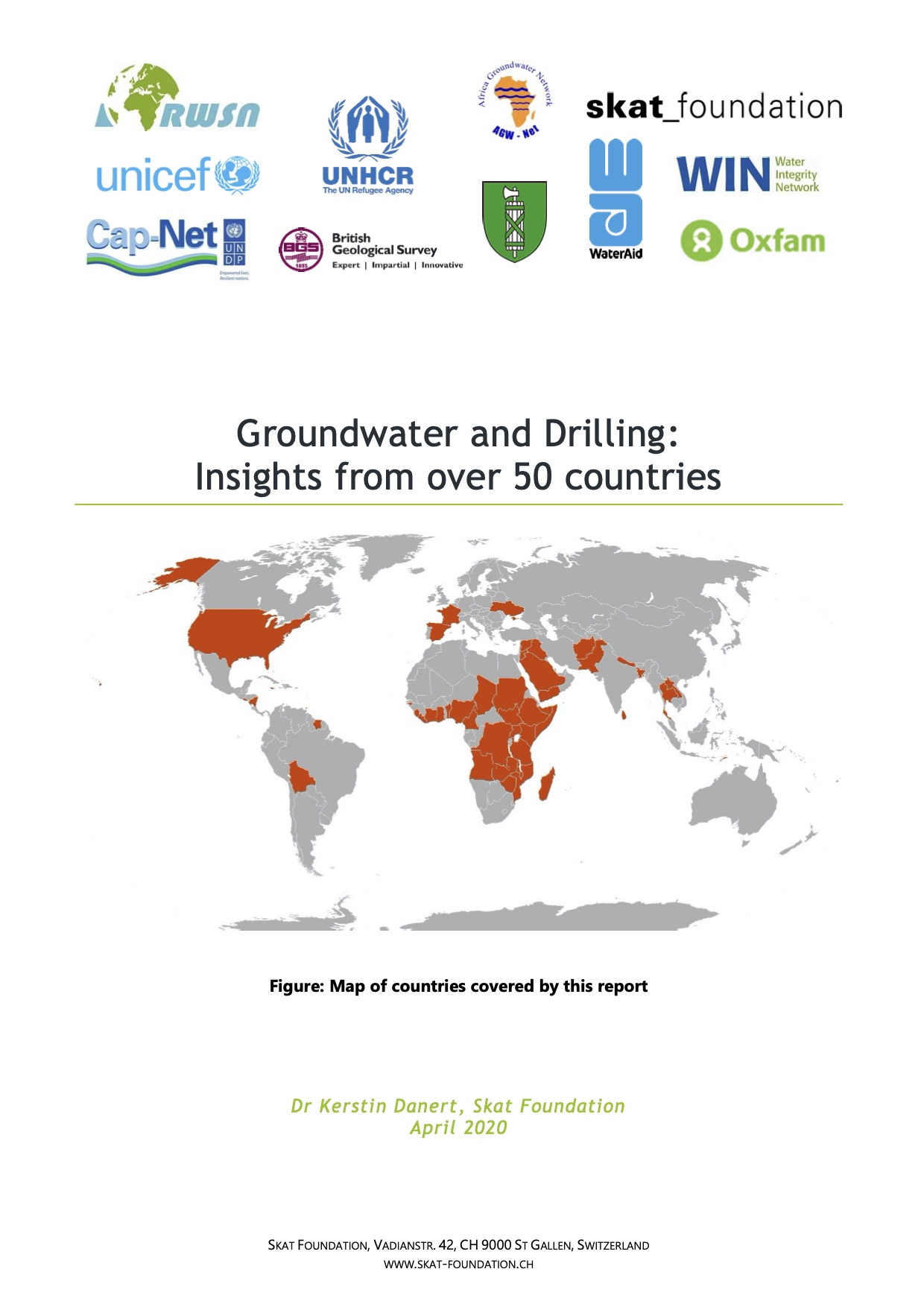 |
Groundwater and Drilling - Insights from over 50 Countries (English) provides insights into groundwater dependency, self-supply, groundwater data, siting, supervision, procurement and contract management, the institutional and legal framework, and the drilling industry from over 50 countries. |
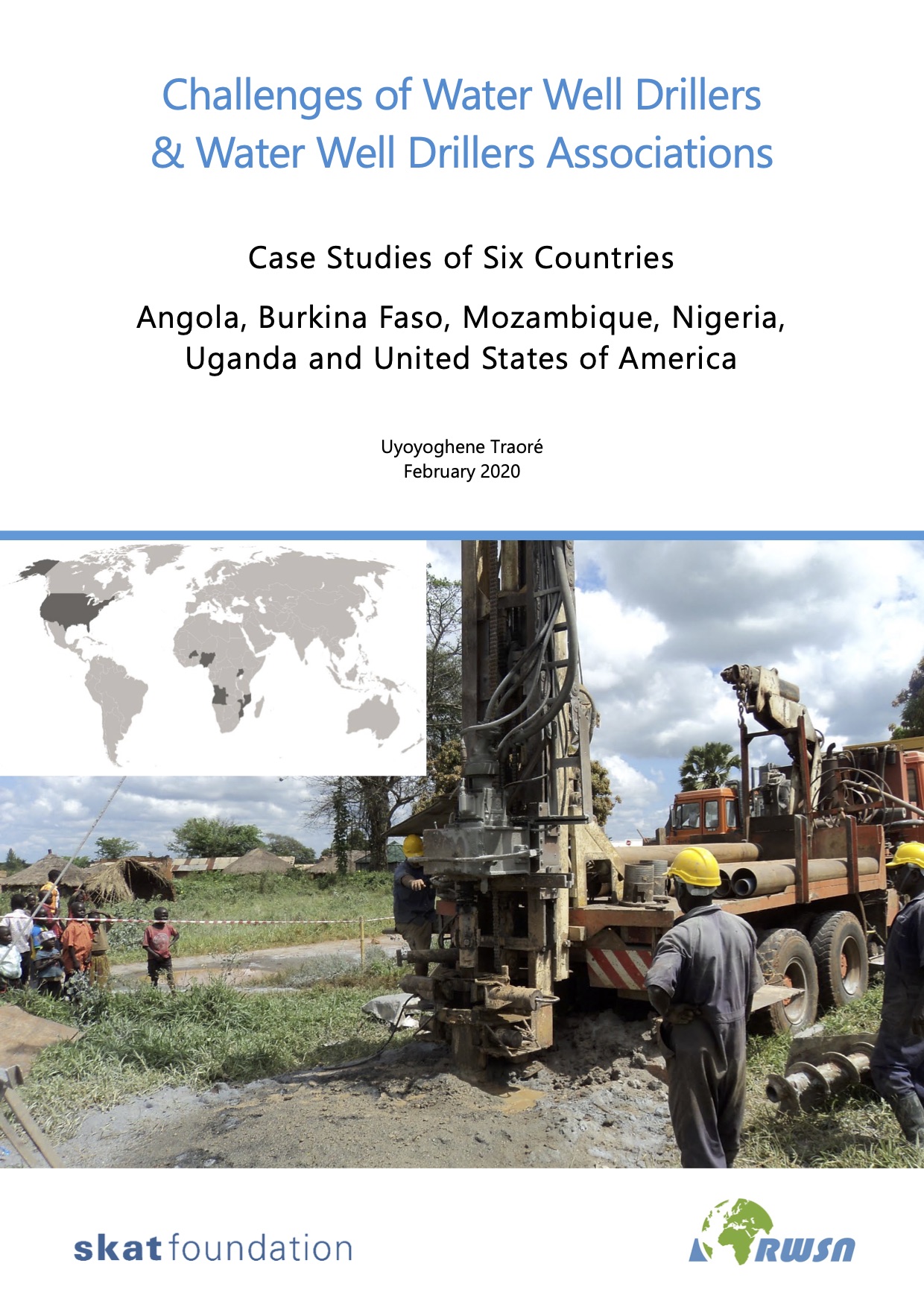 |
Challenges of Water Well Drillers & Water Well Drillers Associations (English) - case studies of six countries: Angola, Burkina Faso, Mozambique, Nigeria, Uganda and the USA |
|
Studies & assessments of water well drilling professionalism:
|
|
|
Films and webinar recordings on various aspects of drilling professionalism including procurement, supervision, tackling corruption, siting, training. |
|
|
Blogs describing efforts from around the world to improve drilling professionalism and ensure that boreholes are cost-effective. |
National regulations, standards, guidelines and manuals for groundwater and water well drilling for select countries
|
All national groundwater and drilling regulations, standards, guidelines and manuals in the RWSN library.
If you have information that you would like to share online through RWSN, please let us know on
What is the RWSN Professional Water Well Drilling topic trying to achieve?
- Outcomes by 2023:
- Skills and knowledge of water well drilling and its management raised.
- National (or state) policies, regulation, standards and procedures for borehole drilling improved.
- Better investments to improve and sustain professional groundwater development.
- Aims by 2030, water well drilling and pump installation is undertaken in a professional manner, with the groundwater data generated used to improve the understanding of groundwater resources.
-
Issues that need to be addressed in many countries include poor quality implementation, use of inferior products, corruption, rogue drilling contractors, little knowledge of borehole drilling, capacity gaps by districts and lengthy contracting procedures. It is recognised that targeted efforts are required to enable the wealth of knowledge available to be systematically embedded into policy and implementation.
Do you want to improve drilling professionalism in your country or organisation?
- Learn more about how to raise borehole drilling professionalism from the key publications, videos and links above.
- Develop and run a training course.
- Volunteer with RWSN as a young professional (under 36 years of age).
- Share your experience and ask questions on the RWSN Online Groundwater Community.
- Publish a blog for RWSN or a more detailed publication about your experiences.
Impact
RWSN materials have been used to improve projects and have been incorporated into the curricula of some academic and training organisations. Specific initiatives to raise drilling professionalism are underway in a number of countries by key international organisations.
If you are interested in any of the above, and would like to communicate with the RWSN theme leadership directly, please write to
 Google Übersetzer
Google Übersetzer

